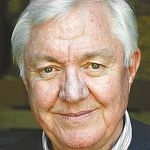 (HOST) The conventional wisdom when assessing relations between nations is that actions speak louder than words. However, this morning commentator Barrie Dunsmore, veteran ABC News foreign and diplomatic correspondent suggests that this may not always be the case.
(HOST) The conventional wisdom when assessing relations between nations is that actions speak louder than words. However, this morning commentator Barrie Dunsmore, veteran ABC News foreign and diplomatic correspondent suggests that this may not always be the case.
(DUNSMORE) Of all the high level international conferences and summits I covered in my career, virtually every one ended with each participant declaring some variation of the phrase – the test of the decisions we have made here will be in our deeds, not our words. That may seem perfectly obvious. But such old saws should not be interpreted as meaning that words don’t really matter.
During his first term President Ronald Reagan took a hard line toward the Soviet Union. But at the time, almost more significant than his deeds were Reagan’s words such as when he called the Soviet Union an "evil empire." This was an escalation of rhetoric that had the effect of actually heating up the Cold War.
Likewise, when President George W. Bush designated Iraq, Iran and North Korea an "axis of evil," this was more than mere name calling.
In a sense, these three countries and their alleged weapons of mass destruction were identified as future targets for American military action. When the U.S. then invaded Iraq, Iran and North Korea had every right to worry that they might be next.
However, in the first one hundred plus days of his administration, President Barack Obama has gone out of his way to set a new tone in America’s relations with the rest of the world. From the moderation of his inaugural speech to his public outreach to the Islamic world; from his respectful messages to Iran and Syria to his promise of fresh starts in relations with Russia and Cuba; Obama’s policy has been to forgo confrontational rhetoric. And the words he has chosen to frame each of America’s major national security problems are not just window dressing. They are the first steps in what promises to be a far more thoughtful and nuanced approach to foreign policy than this country has had at any time in this new century.
As might be expected, this new approach has not found favor among those critics who are scornful when America speaks softly but doesn’t threaten to use its big stick. This disdain for polite discourse is evidently growing as members of Congress on the far right, taking their cues from the likes of Rush Limbaugh, were outraged by the fact that President Obama smiled and shook hands with Venezuelan President Chavez at last week’s Summit of the Americas in Trinidad. They also chastised Obama for not angrily denouncing those Latin leaders who dared criticize America’s long standing and counter-productive Cuban trade embargo.
I take comfort in the fact that many of these same critics on the right were appalled when in his second term, their hero Ronald Reagan reversed course and began to seriously negotiate nuclear arms reductions with then Soviet leader Mikhail Gorbachev. While they now loudly boast about how the U.S. defeated Communism – if Reagan had followed his hardliner’s advice and refused to talk with Gorbachev – the Soviet Union and the Cold War itself would very likely still be with us.